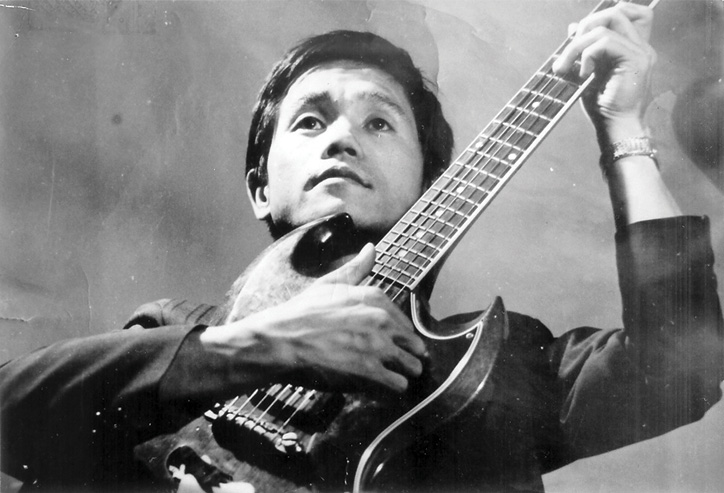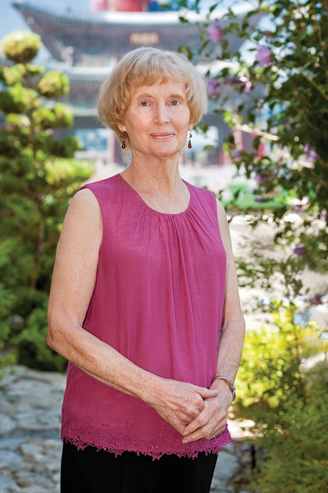South Korean rocker Shin Joong Hyun has been compared to Jimi Hendrix and Eric Clapton. So why have so few heard of him? A recently released anthology aims to rectify the oversight.
by Christina Lee
In 1972, Shin Joong Hyun wrote the song that ended his career.
“Beautiful Rivers and Mountains” is a 10-minute procession, though Shin and his band—simply called The Men—sound bleary-eyed at first. A bass guitar trembles on its own pulse to a militaristic beat, and Shin practically whispers as he and bandmate Park Guang-su sing (lyrics here are translated from Korean), “Blue sky, white clouds / A light breeze fills up my mind.” Shin’s guitar then blares and quickly disperses like radio signals as The Men depict the countryside they’re seeking: the brilliant red sun, the salty ocean waves. “We will live together in the far future / forever here with new dreams / I want to make that happen,” Shin and his band sing.
This was more than just a call to return to greener pastures. Between the lines, then-South Korean President Park Chung-hee and his authoritarian government heard fighting words from Shin. A few weeks prior, Shin had declined two requests from the Blue House—South Korea’s White House—to write propaganda anthems praising Park’s dictatorship. Instead, Shin wrote and recorded “Beautiful Rivers and Mountains,” a paean to the country’s natural beauty, and premiered it on national television.
Park’s government acted swiftly. Even though Shin, then 34, was one of South Korea’s biggest rock stars, his music was decreed too vulgar or noisy, and he was banned from performing. Then, in 1975, Shin was arrested for marijuana possession, taking him out of South Korea’s burgeoning rock scene.
After his release, Shin fled the country. But first, he sold his instruments to support his wife and kids. “I felt like I was giving away a piece of my skin,” the musician, now 73, recalled in an email interview from Seoul, where he resides.
It would turn out that he lost even more than that.
[ad#graphic-square]
Five years after his arrest, Shin returned to Korea. By this time, President Park had been assassinated and the singer was free to rejoin the music scene. He formed a nine-member ensemble, the Music Power Group, which played disco versions of his old hits. But, at their first gig, during their first song, a waiter yelled, “Play a faster song! This tempo is too slow to dance [to].”
Shin and his band walked out.
“I felt that people had become too materialistic and less truthful,” he said. “I thought a slow beat had its own beauty where people could dance to it more gracefully.”

Shin lived in obscurity for years afterwards. He ran a couple of music clubs in Seoul, and quietly continued to release music. There have been scattershot attempts over the years to celebrate Shin’s legacy—a National Public Radio story here, a Wall Street Journal feature there—but nothing stuck, and it seemed like he might go down as a footnote in South Korean music history.
Then, in 2009, Shin’s boosters managed to convince guitar manufacturer Fender to present him with a tribute guitar built exactly like the black-on-black 1969 Stratocaster he once owned. Shin became the first Asian and one of just a dozen musicians in the world to receive such a guitar. Others include Jimi Hendrix, Eric Clapton and Stevie Ray Vaughan.
It might have ended there, if coverage of the 2009 Fender event hadn’t reached Matt Sullivan, founder of Light in the Attic Records, a Seattle-based label. He said he immediately had to learn more about the Korean rocker, and spent the next two years working on Beautiful Rivers and Mountains: The Psychedelic Rock Sound of South Korea’s Shin Joong Hyun, the first U.S.-based release of Shin’s music.
“It’s pretty rare to find artists in their 70s like Shin still playing music, who’s been playing since 1958 and has been through surf and Motown and psychedelic rock and disco,” said Sullivan. “I really wanted to show that as much as possible.”
The anthology’s 14 tracks and 32-page liner notes detail his genre-spanning career, from his early attempts to channel Elvis Presley under the moniker Jackie Shin, the stage name he used while playing for U.S. troops in Korea; to his formation of South Korea’s first rock band ADD4 after hearing the Beatles; and the explorations of psychedelic-rock territory he had been interested in, even before anti-war protestors introduced him to acid. Shin’s work as a songwriter is also highlighted through his hit singles for other singers (The Pearl Sisters, Kim Jung Mi) and the eerie, ambitious suites he composed for others of the many bands he formed (Golden Grapes, the Yup Juns).
“Different genres simply change according to different generational tastes, as trends constantly change over time,” Shin said. “I, too, follow and accept different trends according to its own generation, and then I develop my own taste and style. Each genre has its own unique color. Rather than debating which genre is better, I believe that music is about enjoying unique characteristics of different genres.”

As with many reissues, the main obstacle was to locate the best possible source material. Shin’s lot was complicated by the fact that the South Korean government had destroyed the master tapes to many of Shin’s records. The label had to track down proper source material from a handful of avid Korean music collectors and even Shin himself. “Even in bad condition they were hard to find,” Sullivan said.
Still, things moved relatively quickly, and Light in the Attic spent only two years assembling Beautiful Rivers and Mountains—a short amount of time compared to the label’s other reissues, some of which take five years to complete. Now, the anthology has been distributed to nearly 400 record stores across the U.S., and in nine other countries.
Shin said he is pleased his music will be reaching new audiences. “I was always somewhat sad that Koreans didn’t fully understand my music, but now I am certain that Americans fully understand my music,” he said.
The song that nearly ended his career ends the anthology as well, and it’s one that Shin says he’s never regretted writing. But as the anthology explores his past, the musician is looking elsewhere. His son Dae-cheol helped found Korea’s first heavy metal band, Sinawe, and that tie has kept Shin connected to South Korea’s rock scene. It also eventually sparked Shin’s return to live performance in 2008 at the popular Korean Music Festival at the Hollywood Bowl in Los Angeles.
And the 73-year-old isn’t done yet. He is looking for the next big sound.
“I think that as people get older, people become too simple and passive,” he added. “I want to let them know that life is about how much effort you put in. As a musician, I want to prove this through music. I am trying to find a new sound that I couldn’t find in the first chapter of my life.”
This article was published in the November 2011 issue of KoreAm. Subscribe today!
[ad#bottomad]







